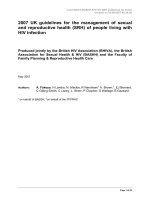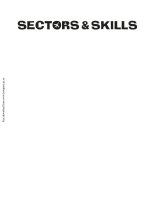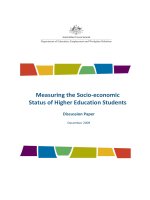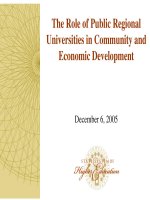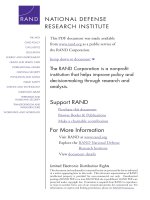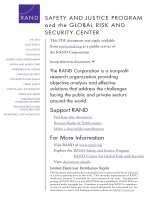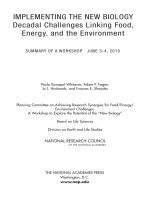THE ARTS CHILD POLICY CIVIL JUSTICE EDUCATION ENERGY AND ENVIRONMENT HEALTH AND HEALTH CARE doc
Bạn đang xem bản rút gọn của tài liệu. Xem và tải ngay bản đầy đủ của tài liệu tại đây (905.25 KB, 164 trang )
This document and trademark(s) contained herein are protected by law as indicated
in a notice appearing later in this work. This electronic representation of RAND
intellectual property is provided for non-commercial use only. Unauthorized
posting of RAND PDFs to a non-RAND Web site is prohibited. RAND PDFs are
protected under copyright law. Permission is required from RAND to reproduce,
or reuse in another form, any of our research documents for commercial use. For
information on reprint and linking permissions, please see RAND Permissions.
Limited Electronic Distribution Rights
Visit RAND at www.rand.org
Explore RAND Project AIR FORCE
View document details
For More Information
This PDF document was made available
from www.rand.org as a public service of
the RAND Corporation.
6
Jump down to document
THE ARTS
CHILD POLICY
CIVIL JUSTICE
EDUCATION
ENERGY AND ENVIRONMENT
HEALTH AND HEALTH CARE
INTERNATIONAL AFFAIRS
NATIONAL SECURITY
POPULATION AND AGING
PUBLIC SAFETY
SCIENCE AND TECHNOLOGY
SUBSTANCE ABUSE
TERRORISM AND
HOMELAND SECURITY
TRANSPORTATION AND
INFRASTRUCTURE
WORKFORCE AND WORKPLACE
The RAND Corporation is a nonprofit
research organization providing
objective analysis and effective
solutions that address the challenges
facing the public and private sectors
around the world.
Purchase this document
Browse Books & Publications
Make a charitable contribution
Support RAND
This product is part of the RAND Corporation monograph series.
RAND monographs present major research findings that address the
challenges facing the public and private sectors. All RAND mono-
graphs undergo rigorous peer review to ensure high standards for
research quality and objectivity.
F. Stephen Larrabee
Prepared for the United States Air Force
Approved for public release; distribution unlimited
PROJECT AIR FORCE
Troubled
Partnership
U.S Turkish Relations
in an Era of Global
Geopolitical Change
The RAND Corporation is a nonprofit research organization providing
objective analysis and effective solutions that address the challenges facing
the public and private sectors around the world. RAND’s publications do
not necessarily reflect the opinions of its research clients and sponsors.
R
®
is a registered trademark.
© Copyright 2010 RAND Corporation
Permission is given to duplicate this document for personal use only, as long
as it is unaltered and complete. Copies may not be duplicated for commercial
purposes. Unauthorized posting of RAND documents to a non-RAND
Web site is prohibited. RAND documents are protected under copyright law.
For information on reprint and linking permissions, please visit the RAND
permissions page ( />Published 2010 by the RAND Corporation
1776 Main Street, P.O. Box 2138, Santa Monica, CA 90407-2138
1200 South Hayes Street, Arlington, VA 22202-5050
4570 Fifth Avenue, Suite 600, Pittsburgh, PA 15213-2665
RAND URL:
To order RAND documents or to obtain additional information, contact
Distribution Services: Telephone: (310) 451-7002;
Fax: (310) 451-6915; Email:
Cover image courtesy of AP Photo/Charles Dharapak.
The research described in this report was sponsored by the United States
Air Force under Contract FA7014-06-C-0001. Further information may
be obtained from the Strategic Planning Division, Directorate of Plans,
Hq USAF.
Library of Congress Cataloging-in-Publication Data
Larrabee, F. Stephen.
Troubled partnership : U.S.–Turkish relations in an era of global geopolitical
change / F. Stephen Larrabee.
p. cm.
Includes bibliographical references.
ISBN 978-0-8330-4756-4 (pbk. : alk. paper)
1. United States—Foreign relations—Turkey. 2. Turkey—Foreign relations—
United States. 3. National security—United States. 4. National security—Turkey.
5. United States—Military relations—Turkey. 6. Turkey—Military relations—
United States. 7. World politics—1989– 8. Geopolitics. 9. Social change. I. Title.
E183.8.T8L36 2010
327.730561—dc22
2009042096
iii
Preface
With the end of the Cold War, many Turks feared that Turkey would
lose its strategic signicance in American eyes. ese fears, however,
have proven to be unfounded. Rather than decreasing, Turkey’s strate-
gic signicance has increased. Turkey stands at the nexus of four geo-
graphic areas of growing strategic importance in the post–Cold War
era: the Balkans, the Middle East, the Caucasus/Central Asia, and the
Persian Gulf region. In each of these areas, Turkey’s cooperation is
critical for achieving U.S. policy goals.
However, in recent years—especially since 2003—U.S Turkish
relations have undergone serious strains. Sharp dierences over Iraq
and the Kurdish issue have been compounded by dierences over
the Middle East, particularly relations with Iran, Iraq, and Syria. At
the same time, Turkey has witnessed a sharp rise in anti-American
sentiment.
1
is monograph examines the causes of recent strains in
the U.S Turkish security partnership and options for reducing these
strains. It should be of interest to U.S. policymakers and other U.S.
ocials monitoring developments in Turkey and its neighborhood.
is research was sponsored by the Director of Operational Plan-
ning, Policy and Strategy, Regional Issues Directorate, Oce of the
Deputy Chief of Sta, Operations, Plans and Requirements, Headquar-
ters United States Air Force (AF/A5XX), and was conducted within the
Strategy and Doctrine Program of RAND Project AIR FORCE as part
1
See Transatlantic Trends, Transatlantic Trends: Key Findings 2007, Washington, D.C.:
German Marshall Fund of the United States, 2007, p. 21. See also Pew Global Attitudes
Project, Global Unease with Major Powers, Pew Research Center, June 27, 2007.
iv Troubled Partnership
of a scal year 2007 study entitled “Troubled Partnerships: e Grow-
ing Challenge of Managing U.S. Security Relationships and Implica-
tions for the United States Air Force.”
RAND Project AIR FORCE
RAND Project AIR FORCE (PAF), a division of the RAND Corpo-
ration, is the U.S. Air Force’s federally funded research and develop-
ment center for studies and analyses. PAF provides the Air Force with
independent analyses of policy alternatives aecting the development,
employment, combat readiness, and support of current and future aero-
space forces. Research is conducted in four programs: Aerospace Force
Development; Manpower, Personnel, and Training; Resource Manage-
ment; and Strategy and Doctrine.
Additional information about PAF is available on our Web site:
/>v
Contents
Preface iii
Figures
ix
Summary
xi
Acknowledgments
xxi
Abbreviations
xxiii
CHAPTER ONE
Introduction 1
CHAPTER TWO
e U.S Turkish Security Partnership in Transition 3
U.S. and Turkish Interests
3
Changing Turkish Perceptions of the Security Partnership
5
e End of the Cold War
6
e Impact of the Gulf War
7
CHAPTER THREE
Iraq and the Kurdish Challenge 11
e March 1, 2003, Parliamentary Vote
12
e Resurgence of the PKK
14
Growing Anti-American Sentiment
16
e Ralston Mission
18
e Shift in U.S. Policy
19
Turkish-KRG Relations
21
e Impact of the July 2009 Kurdish Elections
24
e Problem of Kirkuk
25
vi Troubled Partnership
e Internal Kurdish Dimension 26
Iraq’s Uncertain Political Evolution
30
CHAPTER FOUR
e Broader Middle East 33
U.S Turkish Dierences over Iran and Syria
34
Iran’s Nuclear Ambitions
36
e Impact of the June 2009 Iranian Presidential Election
37
Relations with Syria
39
Lebanon and the Broader Regional Stage
40
Growing Ties to the Gulf Cooperation Council
41
e Israeli Connection
43
Democracy Promotion in the Middle East
45
CHAPTER FIVE
Russia and Eurasia 47
e Russian Factor
48
Turkish-Armenian Rapprochement
51
e Armenian Genocide Resolution
55
e Broader Regional Dimension
56
e Energy Dimension
57
CHAPTER SIX
e European Dimension 63
e Changing Turkish Domestic Context
64
European Attitudes Toward Turkish Membership
65
Waning Turkish Support for EU Membership
68
Relations with Greece
71
Cyprus
73
e Uncertain Outlook
74
CHAPTER SEVEN
U.S Turkish Defense Cooperation 77
Military-to-Military Cooperation
80
Use of Turkish Bases and Facilities
82
Maritime Cooperation in the Black Sea
84
e NATO Connection
85
Contents vii
CHAPTER EIGHT
e Domestic Context 89
Religion and Identity
89
Kemalism Versus Neo-Ottomanism
91
e Nature of the Kemalist Revolution
93
Modernization, Social Change, and the Rise of Islam
95
e Ideological Transformation of the Islamic Movement
96
Growing Internal Polarization
98
e March 2009 Municipal Elections
101
Tensions with the Military
103
e Impact of the Global Economic Crisis
107
CHAPTER NINE
Alternative Turkish Futures 111
A Pro-Western Turkey Integrated into the European Union
111
An “Islamisized” Turkey
113
A Nationalist Turkey
114
Military Intervention
115
CHAPTER TEN
Conclusion: Revitalizing the U.S Turkish Relationship 119
Northern Iraq and the PKK
119
e Middle East
121
Eurasia and the Caucasus
122
Turkish Membership in the European Union
123
Turkish-Greek Relations and Cyprus
124
Defense Cooperation
124
Democratization and Domestic Reform
125
Bibliography
127
ix
Figures
5.1. e Nabucco Pipeline 57
6.1. European Public Opinion: Should Turkey Be Invited to
Join the EU?
66
6.2. European Public Opinion: If Turkey Were to Implement
Reforms Desired by Some EU Member States, Should It
Be Invited to Join the EU?
67
xi
Summary
A strong security partnership with Turkey has been an important ele-
ment of U.S. policy in the Mediterranean and the Middle East since
the early 1950s. It is even more important today. Turkey stands at the
nexus of four areas that have become increasingly critical to U.S. secu-
rity since the end of the Cold War: the Balkans, the Middle East, the
Caucasus/Central Asia, and the Persian Gulf region. In all four areas,
Turkey’s cooperation is vital for achieving U.S. policy goals.
However, in the last few years—and especially since 2003—
U.S Turkish relations have seriously deteriorated. e origins of many
of the strains can be traced back to the rst Gulf War. However, the
strains were signicantly exacerbated by the fallout from the 2003 U.S.
invasion of Iraq, which resulted in a serious deterioration in Turkey’s
security environment. As a consequence of the invasion, sectarian vio-
lence in Iraq increased, and the Iraqi Kurds’ drive for autonomy and
eventual independence gained greater momentum. (See pp. 11–20.)
Turkish ocials fear that the creation of a Kurdish state on Tur-
key’s southern border could intensify separatist pressures in Turkey and
pose a threat to its territorial integrity. ese fears have been exacer-
bated by the resumption of an insurgency by the Kurdistan Workers’
Party (PKK), which has stepped up cross-border terrorist attacks against
Turkish territory from sanctuaries in northern Iraq. ese terrorist
attacks are Turkey’s number-one security concern. (See pp. 25–29.)
e U.S. reluctance to take military action against the PKK or to
allow Turkey to take unilateral military action against PKK sanctuar-
ies in northern Iraq after the 2003 invasion caused serious strains in
xii Troubled Partnership
Washington’s relations with Ankara. It also provoked a sharp rise in
anti-American sentiment in Turkey, which, if not halted, threatens to
pose serious long-term consequences for the U.S. security partnership
with Turkey.
ese strains have been compounded—and to some extent
reinforced—by dierences over policy toward Iran and Syria. Whereas
the United States sought until very recently to isolate both countries,
Turkey has pursued a policy of rapprochement with Iran and Syria.
As a result, U.S. and Turkish policies toward Iran and Syria have been
increasingly at odds. is divergence began to manifest itself before
the assumption of power in Ankara by the Justice and Development
Party in 2002, but it has become more pronounced since then. (See
pp. 34–40.)
Iran’s nuclear ambitions could become a further source of strain.
Turkey is concerned by Iran’s nuclear program because such a pro-
gram could stimulate a regional arms race, which could force Turkey
to take compensatory measures. However, Turkey is strongly opposed
to a military strike against Iran, fearing that a strike would lead to fur-
ther destabilization of the Middle East. A U.S. military strike against
Iran would create a crisis in U.S Turkish relations and could prompt
the Erdoğan government to halt or curtail U.S. use of Turkish military
facilities, particularly the air base at İncirlik. (See pp. 36–37.)
U.S. defense cooperation with Turkey has undergone a downturn
in the last few years. Congress has held up a number of major weapon
sales to Turkey due to Turkey’s human-rights policy and policy toward
Cyprus. Turkey has begun to regard the United States as a less-than-
reliable defense partner and has expanded its defense relationships
with countries that impose fewer procurement restrictions, particularly
Israel and Russia. e U.S Turkish defense-industry relationship has
stagnated lately. Until Sikorsky nalized a sale of 17 Seahawk helicop-
ters in fall 2006, no U.S. rm had won a major direct commercial sale
in Turkey since 2002. (See pp. 77–87.)
Summary xiii
Revitalizing U.S Turkish Relations: The Policy Agenda
e arrival of a new administration in Washington presents an impor-
tant opportunity for repairing the ssures in the U.S Turkish security
partnership and putting relations on a rmer footing. President Barack
Obama’s visit to Ankara in April 2009 helped to set a new tone in
relations. But the visit needs to be followed up by concrete steps in a
number of areas outlined below if the U.S Turkish security partner-
ship is to be infused with new vitality and strength.
Northern Iraq and the PKK
e United States should increase its political and intelligence
support for Turkey’s struggle against PKK terrorism. U.S. support
for Turkey’s struggle against the PKK is regarded by Turkish ocials
as the litmus test of the value of the U.S Turkish security partnership.
e visible increase in anti-American sentiment in Turkey in recent
years has been driven to an important degree by a perception that the
United States is tacitly supporting the Iraqi Kurds. Strong support for
Turkey’s struggle against the PKK would have an important political-
psychological impact on Turkish public opinion and help undermine
this widespread perception. (See pp. 119–120.)
In addition, the United States should put greater pressure
on the Kurdistan Regional Government (KRG) to crack down
on the PKK and cease its logistical and political support of the
group. Such pressure would have a positive impact on Washington’s
relations with Ankara and weaken the growth of anti-American senti-
ment among the Turkish public. However, anti-American sentiment in
Turkey has complex roots and reects more than just discontent with
President George W. Bush’s policy toward Iraq and the PKK. us,
any shift in U.S. policy is likely to take longer to have a positive impact
on public attitudes in Turkey than elsewhere in Europe. (See p. 120.)
e PKK threat cannot be resolved by military means. A
strong antiterrorist program is essential, but to be successful, it
must be combined with social and economic reforms that address
xiv Troubled Partnership
the root causes of the Kurdish grievances. e Erdoğan government’s
“Kurdish Opening,” launched in the summer of 2009, represents an
encouraging sign that the government is beginning to recognize this.
e initiative has sparked an intense internal debate in Turkey. If the
initiative proves to be a serious eort to address Kurdish grievances, it
could signicantly reduce tensions between the Turkish authorities and
the Kurdish community in Turkey and contribute to the wider process
of democratization in the country. (See p. 120.)
e United States should strongly encourage and support
Turkey’s eorts to open a direct dialogue with the leadership
of the KRG in northern Iraq. ere can be no stability on Tur-
key’s southern border over the long term without an accommodation
between the Turkish government and the KRG. is does not mean
that Turkey should recognize an independent Kurdish state, but for
regional stability to exist, Turkey needs to work out a modus vivendi
with the KRG. Ultimately, this can only be achieved through a direct
dialogue with the KRG leadership. e Erdoğan government has taken
important steps in this direction since late 2008. Indeed, the two sides
appear to be moving by ts and starts toward a rapprochement. How-
ever, the rapprochement is fragile and needs strong U.S. support. (See
pp. 120–121.)
As the United States withdraws its forces from Iraq, it needs
to intensify eorts to defuse tension between the KRG and the
central government in Baghdad. is growing tension represents a
serious threat to Iraq’s viability as an integral state and could seriously
complicate Turkey’s security challenges. e U.S. military presence has
acted as an important stabilizing force in northern Iraq and helped pre-
vent tension between the Iraqi Kurds and Arabs from breaking out into
open conict. But U.S. leverage and ability to inuence the situation
on the ground in Iraq will decline as the United States draws down
its military forces. us, the United States needs to intensify eorts
to get the two sides to resolve their political dierences—especially
their boundary disputes—now while Washington still has some politi-
cal leverage. e United States should maintain some military presence
in northern Iraq as long as possible without violating the terms of the
Status of Forces Agreement signed with the Maliki government at the
Summary xv
end of 2008. is could help prevent current tension from escalating
into open conict as the two sides seek to resolve their political dier-
ences. (See p. 121.)
The Middle East
U.S. policymakers should avoid portraying Turkey as a model for
the Middle East. e notion of Turkey as a model makes many Turks,
especially the secularists and the military, uncomfortable because they
feel it pushes Turkey politically closer to the Middle East and weakens
Turkey’s Western identity. In addition, they fear that it will strengthen
political Islam in Turkey and erode the principle of secularism over the
long run. e latter concerns are particularly strong within the Turkish
armed forces. (See p. 121.)
e United States should continue to express a readiness to
open a dialogue with Iran and Syria and to engage both countries
in diplomatic eorts to help stabilize Iraq as it draws down its
forces there. Such a move is unlikely to lead to dramatic changes in
Iranian or Syrian policy overnight, but it would make it harder for the
two regimes to blame the United States for the poor state of bilateral
relations and could open new possibilities for enhancing regional sta-
bility over the longer run. At the same time, it would bring U.S. and
Turkish policy into closer alignment and reduce an important source
of friction in U.S Turkish relations. (See pp. 121–122.)
Washington should also intensify its eorts to persuade
Tehran to abandon any attempt to acquire nuclear weapons. A
nuclear-armed Iran would have a destabilizing impact on security in
the Persian Gulf region and could spark a nuclear arms race in the Gulf
and Middle East, a race that could have important consequences for
Turkish security. To date, Turkey has shown little interest in develop-
ing its own nuclear deterrent, and it is unlikely to do so as long as the
U.S. nuclear guarantee and the North Atlantic Treaty Organization
(NATO) remain credible. However, if Turkish relations with Wash-
ington and NATO deteriorate, Ankara might be prompted to con-
sider acquiring a nuclear deterrent of its own. is underscores the
xvi Troubled Partnership
importance of maintaining close U.S Turkish security ties and keep-
ing Turkey rmly anchored in NATO. (See p. 122.)
Eurasia and the Caucasus
e United States should support recent eorts to promote an
improvement in relations between Turkey and Armenia, partic-
ularly the opening of the Turkish-Armenian border. e normal-
ization of relations between Ankara and Yerevan would signicantly
contribute to enhancing peace and stability in the Caucasus. It would
also enable Armenia to reduce its economic and political dependence
on Russia and Iran. us, a normalization of relations between Turkey
and Armenia is strongly in U.S. interests. (See p. 122.)
e Obama administration should work closely with Con-
gress to prevent the passage of an Armenian genocide resolution.
Passage of such a resolution could cause the Erdoğan government to
come under strong domestic pressure to take retaliatory action against
the United States, possibly curtailing U.S. use of İncirlik Air Base. Such
a move would have a strongly detrimental impact on the ability of the
United States to resupply its forces in Afghanistan and could compli-
cate the withdrawal of U.S. combat troops from Iraq. At the same time,
Turkey should be encouraged to address more openly the events sur-
rounding the mass deaths of Armenians at the hands of the Ottoman
authorities in the nal days of the Ottoman Empire. Clarication of
the events during this tragic period is a prerequisite for a durable and
lasting reconciliation with Armenia and would enhance Turkey’s repu-
tation as an open and modern democratic state. (See pp. 122–123.)
Turkish Membership in the European Union
e United States should continue to support Turkey’s member-
ship in the European Union (EU). Turkey’s integration into the EU
would strengthen the EU and help put to rest the claim that the West—
especially Europe—is innately hostile to Muslims. is could have a
salutary eect on the West’s relations with the Muslim world. Indeed,
Summary xvii
a moderate, democratic Turkey could act as an important bridge to the
Middle East. Conversely, rejection of Turkey’s candidacy could pro-
voke an anti-Western backlash, strengthening the forces in Turkey that
want to weaken Turkey’s ties to the West. Such a development is in the
interest of neither the EU nor the United States. (See p. 123.)
However, given the sensitivity of the issue of Turkey’s EU
membership among EU member states, the United States should
support Turkish membership through quiet diplomacy behind the
scenes and avoid overt pressure and arm-twisting. Such tactics are
likely to cause resentment among EU members and could even hurt
Turkey’s chance of obtaining membership. At the same time, Wash-
ington needs to recognize that Turkish membership in the EU—if it
occurs—would alter the tone and character of U.S Turkish relations
over the long run. Although Ankara will continue to want strong secu-
rity ties to Washington, Turkish leaders would look increasingly to
Brussels rather than to Washington on many issues once Turkey joined
the EU. As a result, Turkey’s foreign policy would likely become more
“Europeanized” over time. (See pp. 123–124.)
Turkish-Greek Relations and Cyprus
e United States should intensify eorts to get Greece and Turkey
to resolve their dierences over the Aegean. Although Turkish-
Greek relations have signicantly improved since 1999, dierences
over the Aegean continue to mar bilateral relations and pose a threat
to stability in the Eastern Mediterranean. Unless these dierences are
resolved, there is a danger that some incident could escalate out of con-
trol and lead to armed conict, as almost happened over the islets of
Imia/Kardak in February 1996. At a time when NATO faces serious
challenges in Afghanistan and the post-Soviet space, the last thing the
United States needs is a new crisis in the Aegean. (See p. 124.)
e United States should also encourage and support the inten-
sication of the intercommunal dialogue being conducted under
UN auspices between the two Cypriot communities. Although the
danger of Turkish-Greek conict over Cyprus has receded in recent
xviii Troubled Partnership
years, the lack of a Cyprus settlement remains an important obstacle to
Turkey’s aspirations for EU membership. Progress toward a settlement
of the Cyprus dispute would give Turkey’s membership bid critical new
momentum at a time when accession negotiations have visibly slowed.
It would also contribute to greater overall security and stability in the
Eastern Mediterranean. (See p. 124.)
Defense Cooperation
In the wake of the Obama visit, Washington should initiate
a broad strategic dialogue with Ankara about the future use of
Turkish bases, particularly İncirlik. Given Turkey’s growing inter-
ests and increasingly active policy in the Middle East, Ankara is likely
to be highly sensitive about allowing the United States to use Turkish
bases, especially İncirlik, for Middle East contingencies. e United
States therefore cannot assume that it will have automatic use of Turk-
ish bases in Middle East contingencies unless such use is regarded as
being in Turkey’s direct national interest. (See pp. 124–125.)
Ballistic missile defense could be an important area for
future U.S Turkish defense cooperation. In light of the growing
threat posed by the possible acquisition of nuclear weapons by Iran,
the United States should explore missile-defense options, both bilater-
ally and through NATO, to ensure that Turkish territory is protected
against the growing threat posed from ballistic missiles launched from
the Middle East. (See p. 125.)
Democratization and Domestic Reform
e United States should encourage Turkey to undertake fur-
ther steps to revitalize the process of democratization and domes-
tic reform. Although the Erdoğan government pursued a reformist
agenda during its rst several years, the process of democratization and
domestic reform has slowed since 2005 and needs new impetus. ese
reforms are necessary not only to give Turkey’s EU-membership bid
Summary xix
new traction—they are also important in their own right independent
of Turkey’s desire to gain admittance to the EU. (See p. 125.)
e United States should not overreact to the growth of reli-
gious consciousness in Turkey. Turkish Islam is more moderate and
pluralistic than Islam elsewhere in the Middle East. Turkey’s long his-
tory of seeking to fuse Islam and Western inuences dates back to
the late Ottoman period. is history dierentiates Turkey from other
Muslim countries in the Middle East and enhances the chances that
Turkey will be able to avoid the sharp dichotomies, ruptures, and vio-
lence that have characterized the process of political modernization in
the Middle East. Moreover, the more democracy, pluralism, and tol-
erance there is in Turkey, the less threatening the growth of religious
consciousness will be. (See pp. 125–126.)
xxi
Acknowledgments
e author would like to express his appreciation to Marc Grossman,
Ian Lesser, and Barak Salmoni for their helpful comments on an ear-
lier draft of this monograph. He would also like to thank Morton
Abramowitz, Mustafa Akyol, Egemen Bağış, Gen Edip Başer, Mehmet
Ali Birand, Matt Bryza, Cengiz Çandar, Ahmet Davutoğlu, Dan Fata,
Emre Gönensay, Richard Holbrooke, Robert Hunter, Yusuf Kanlı,
Suat Kınıklıoğlu, Aliza Markus, David Ochmanek, Soli Özel, Mark
Parris, Gen (ret.) Joseph Ralston, Defne Samyeli, Özdem Sanberk,
Nabi Şensoy, Gönül Tol, İlter Turan, Ross Wilson, and Yaşar Yakış for
their helpful insights during preparation of the manuscript. Any mis-
takes or errors of judgment are solely the responsibility of the author.
xxiii
Abbreviations
AKP Justice and Development Party
bcm billion cubic meters
Blackseafor Black Sea Naval Cooperation Task Force
CENTCOM U.S. Central Command
CHP Republican People’s Party
DTP Democratic Society Party
EC European Community
EU European Union
GCC Gulf Cooperation Council
KRG Kurdistan Regional Government
MOU memorandum of understanding
NATO North Atlantic Treaty Organization
NSC National Security Council
PAF Project AIR FORCE
PKK Kurdistan Workers’ Party
PUK Patriotic Union of Kurdistan
TESEV Turkish Economic and Social Studies Foundation
TGS Turkish General Sta
TRNC Turkish Republic of Northern Cyprus
UN United Nations

